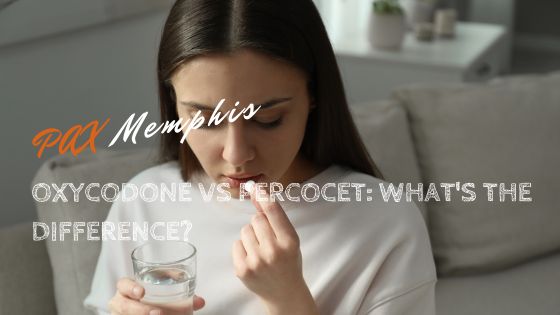Opioids are a class of drugs that depress the central nervous system (CNS). Doctors often prescribe them to treat moderate to severe pain after injuries, surgery, or when someone has a chronic pain condition. While opioids are effective in managing pain, they are also habit-forming and addictive.
Addiction to opioids puts you at risk of experiencing a life-threatening overdose. According to the National Institute on Drug Abuse (NIDA), opioids were responsible for 80,411 overdoses in 2021.
Two of the most known opioid pain relief medications are oxycodone and Percocet. Oxycodone is a generic medication that can be prescribed on its own to relieve pain. Percocet is a combination medication that contains both oxycodone and acetaminophen.
What is Oxycodone?
Oxycodone is an opioid medication that is prescribed for moderate to severe pain. It comes in a few different brand names, including Roxicodone, Oxaydo, and Xtampza ER. There are various types of oxycodone products, including Percocet.
Doctors prescribe oxycodone for its pain-relieving properties. While oxycodone can relieve pain, it poses a great risk for physical dependence and addiction.
The common side effects of oxycodone include:
- Dry mouth
- Stomach pain
- Dizziness and drowsiness
- Nausea or vomiting
- Flushing
- Headaches
- Mood changes
Oxycodone is a CNS depressant that may lower your blood pressure and heart rate. Abusing oxycodone will lead to an addictive high that causes drowsiness and euphoria. If you abuse oxycodone long-term, you will develop an opioid use disorder.
What is Percocet?
Percocet is the brand name for an opioid drug that contains a combination of oxycodone and acetaminophen. Acetaminophen is included in the medication because it can add an extra layer of pain relief.
Long-term use of Percocet will result in addiction. Unfortunately, this puts you at risk of experiencing withdrawal symptoms upon cessation.
Percocet causes side effects of both oxycodone and acetaminophen, which include:
- Dizziness and drowsiness
- Tiredness
- Feelings of extreme happiness or sadness
- Nausea, vomiting, and stomach pain
- Constipation
- Headaches
- Skin reactions like rashes or itching
- Liver damage
Since Percocet is highly addictive, you should seek help if you begin abusing the medication. Drug rehab centers can help you overcome opioid addiction with a combination of medical treatments and evidence-based therapies.
What is the Difference Between Oxycodone and Percocet?
Oxycodone and Percocet have many similarities, as one of the main ingredients in Percocet is oxycodone. That being said, there are some differences to be aware of.
The main differences between oxycodone and Percocet include:
Contents
While both medications contain oxycodone, Percocet also has acetaminophen. Acetaminophen is the main ingredient in Tylenol, a pain and fever reducer. Since Percocet has two types of pain-relieving substances, it might be preferred over oxycodone among medical professionals.
Side Effects
Percocet contains acetaminophen, so it comes with extra side effects to be aware of. While abusing either oxycodone or Percocet is dangerous, there are additional risks associated with Percocet because of the acetaminophen. In large doses, acetaminophen abuse could lead to life-threatening liver failure.
Additionally, Percocet can lead to severe skin reactions. For example, people can develop the following skin conditions when taking acetaminophen:
- Toxic epidermal necrolysis (TEN)
- Acute generalized exanthematous pustulosis (AGEP)
- Stevens-Johnson syndrome (SJS)
It is important to note that while they can occur, these skin reactions are rare. Your doctor should be able to help you determine your risk of experiencing severe reactions to acetaminophen.
Formulations
Oxycodone and Percocet come in different formulations. For example, Percocet is only available in an immediate-release tablet and a liquid solution.
On the other hand, oxycodone comes in a variety of formulas, including:
- Tablets
- Capsules
- Liquid solutions
- Extended-release tablets or capsules
While Percocet might provide an extra layer of pain relief, some doctors prefer oxycodone for its variety of formulations. If someone has a chronic pain condition, having the option to prescribe an extended-release pill might be more beneficial.
Are Oxycodone and Percocet Addictive?
Both oxycodone and Percocet depress the central nervous system. This can lead to effects like drowsiness, dizziness, and feelings of euphoria. Unfortunately, it is possible to become addicted to the high that these substances can produce.
If you become addicted to oxycodone or Percocet, you have an opioid use disorder. The signs of opioid addiction include:
- Continuing to use opioids despite facing physical or mental health effects
- Using opioids even though they are causing social or relationship issues
- Losing interest in previously enjoyed activities
- Having a hard time fulfilling responsibilities at home, school, or work
- Using more opioids than you intend to
- Experiencing cravings to misuse opioids
- Wanting to quit using opioids but being unsuccessful
- Needing to increase the dose of opioids you consume to experience the desired effect
- Experiencing withdrawal symptoms when you stop using opioids
If you or a loved one suffers from an addiction to oxycodone or Percocet, drug rehab can help. These programs will offer the tools and support you need to achieve recovery. For example, addiction treatment involves therapy, counseling, and developing healthy coping mechanisms.
Find Help for Percocet or Oxycodone Abuse
Opioid addiction can be difficult to overcome. Thankfully, opioid rehab programs make the recovery process much easier. If you or a loved one requires help, PAX Memphis is here to support you. We can help you find a drug rehab center that suits your specific needs.
Contact us today to get connected with an opioid rehab program near you.
Medically Reviewed: September 25, 2019

All of the information on this page has been reviewed and verified by a certified addiction professional.










